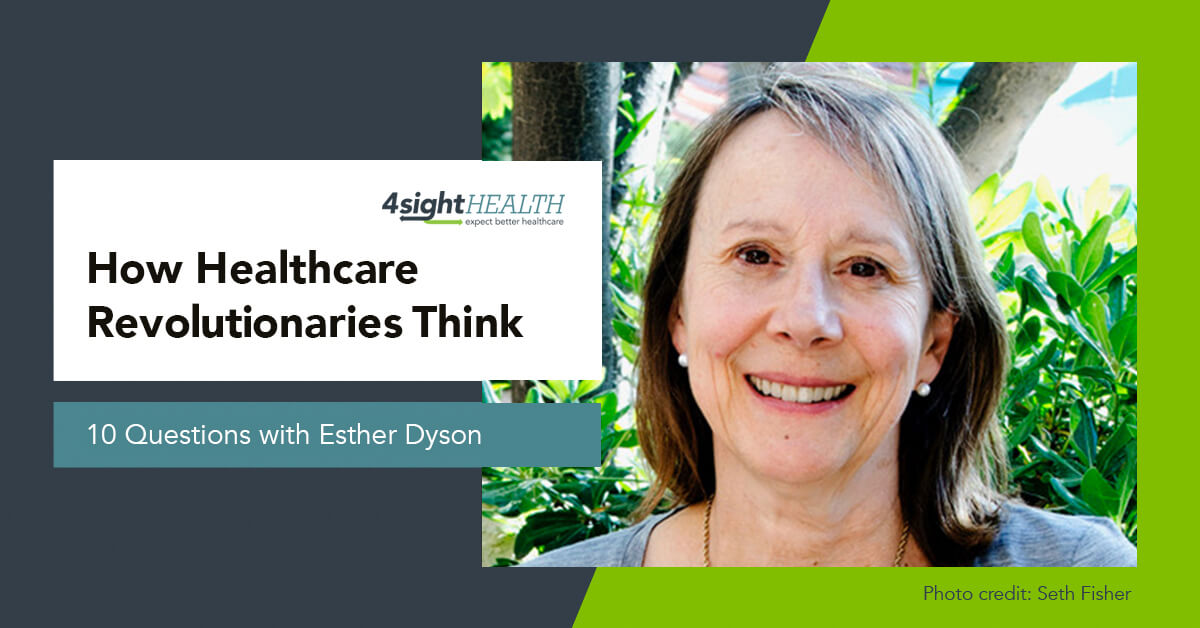June 30, 2022

How Healthcare Revolutionaries Think: 10 Questions with Esther Dyson
Welcome to the latest installment of 4sight Health’s series, How Healthcare Revolutionaries Think. Our interview series profiles healthcare instigators who believe that outcomes matter, customers count and value rules.
When I told people I was going to interview Esther Dyson for this series, they said things to me like, “Oh, she’s a trip!” or “You’ll just love her!” or “She’s quite a character!” Well, all those things turned out to be true, but they barely scratched the surface of describing someone who is so deeply and truly committed to improving community health by permanently eliminating the root causes of poor community health.
Dyson is the founder of Wellville, a 10-year not-for-profit project to improve community health, working in five communities: Clatsop County, Ore.; Lake County, Calif.; Muskegon County, Mich.; North Hartford, Conn.; and Spartanburg, S.C. With two and a half years left in the project, we talked to Dyson about her journey from journalist to entrepreneur to evangelist to space (almost).
1. Why don’t we start by asking you how you would define a healthcare revolutionary. What would be your criteria?
Dyson: Honestly, I don’t go around defining myself or other people that much. I certainly have lots of opinions. I’m not shy. But being a revolutionary is like a lot of things. People talk about innovation all the time, but there’s good innovation, and there’s bad innovation.
2. Well, how about picking your favorite healthcare revolutionary, past or present. Does anyone come to mind who would fit whatever definition you have? Someone whose innovation was good?
Dyson: John Snow, if I had to pick somebody to answer your question. Here’s a guy who looked at the data. He looked at data about the people who got sick. They happened to be near this particular pump. So, he disabled the pump. And people stopped getting sick.
 3. How is Snow different from healthcare revolutionaries today?
3. How is Snow different from healthcare revolutionaries today?
Dyson: In a word, prevention. Snow stopped something bad from happening before it happened. He didn’t try to fix it later. It’s not about a “cure-for-X.” It’s about giving people the resilience not to succumb to X in the first place. A lot of current healthcare revolutionaries are people who would say, “Defund predatory healthcare!” Sure, but defund it in favor of people fostering health — not by reducing taxes.
4. Given your work in prevention, do you consider yourself a healthcare revolutionary like John Snow?
Dyson: No. I don’t ask the question in the first place: Am I a healthcare revolutionary? I mean, that’s not what I’m trying to do — be a healthcare revolutionary. I would describe myself as a fighter for justice. The doorman in my building said to me, “You’re such a sweetie.” I’m motivated more by fighting for justice than by being sweet.
5. There are a lot of ways to fight for justice. One is being a journalist, which is the greatest profession in the world. You started your career as a journalist. What attracted you to it? Why did you leave it?
Dyson: That’s true. When I was eight, I founded, edited and published The Dyson Gazette, which was six copies on carbon paper. It was a newspaper of family stories: George got an A in a third-grade class. Someone else got a cat. I found some copies when I was cleaning up a few years ago. Being a journalist was my default goal, but not my life’s ambition. It was like, “If nothing better comes along, this is what I’d like to do, be Moscow bureau chief of the New York Times.” Ha!
I had applied to Variety, but of course, everyone wanted to write for Variety then, and cover the movie and TV business. Variety didn’t hire me, but ultimately Forbes did. I got a job as a fact-checker of other people’s work, but if you could come up with a good-enough story idea, then you could go do your own story. Mostly I did. It was an amazing three years. I was 22 or something, and I got to travel around the world and meet CEOs. I went to see Robert Crandall at American Airlines. He was talking and threw a ball of crumpled up paper in his trash can. I talked to the head of American Motors who offered me a test drive in a Pacer, which was awkward because I don’t know how to drive. It was three years of asking questions, telling stories and understanding how the world of finance works.
Then I decided I wanted to make the investment decisions, not just tell the stories, and I moved to Wall Street. Of course, I discovered that my job was telling stories to clients. Ultimately, in 1983, I joined and then I bought EDventure, which was a newsletter and conference company, and did that for 25 years. Since 2007, I have been investing in and advising startups in mostly health, human capital, logistics and aerospace.
6. When did you get the idea for Wellville? Where did that come from?
Dyson: It was me being a journalist and asking, “Why are we spending so much money so ineffectively trying to fix people instead of trying keep them from getting broken?” The question popped into my head a number of times. Once was after I interviewed Charlie Silver, who was the founder and CEO of RealAge, which is now owned by Sharecare. On the RealAge site, you could answer a bunch of questions about what we now call social determinants of health, like “Do you live with someone?” “Do you have a pet?” “What do you eat?” “Do you get enough exercise?” “Do you get enough sleep?” and it gave you your so-called “real age.”
 But what struck me was not ShareCare, but whom Silver sold his first business to: Jiffy Lube. I thought, “Hmmm. Car maintenance? Body maintenance? Why don’t we have a Jiffy Lube business for human health?” That ultimately led to the idea for Wellville, which I announced on May 13, 2013, with very little idea of what it would become. Most of all, I got lucky, and got Rick Brush, formerly with Cigna, to join as CEO. We put out a call for communities to join and got 42 applications, and visited 10 of them in the summer of 2014 — an amazing education in itself! We started the 10-year stint officially at the beginning of 2015.
But what struck me was not ShareCare, but whom Silver sold his first business to: Jiffy Lube. I thought, “Hmmm. Car maintenance? Body maintenance? Why don’t we have a Jiffy Lube business for human health?” That ultimately led to the idea for Wellville, which I announced on May 13, 2013, with very little idea of what it would become. Most of all, I got lucky, and got Rick Brush, formerly with Cigna, to join as CEO. We put out a call for communities to join and got 42 applications, and visited 10 of them in the summer of 2014 — an amazing education in itself! We started the 10-year stint officially at the beginning of 2015.
7. Wellville is a 10-year project. That means you have two and a half years to go. How does it end? How do you know when you’re done?
Dyson: Oh, we won’t be done. When do you become a grownup? When you become 18? Or maybe not until you’re 30? The formal project is slated to end at the end of 2024. Then I, and those of us who want to, will start spreading the word about what we’ve been doing. We don’t want to scale by hiring more people and doing more communities. We want to scale by having other communities copy our communities. We want people to say, “Oh, if those people in Muskegon, or Spartanburg, or North Hartford could do it, so can we!”
In the end, we’re not talking about building shiny new communities. We’re helping communities to fix things for themselves — more with questions than with tidy answers. For example, “What could you do if you collaborated with this other community organization instead of competing for grants? What if you took an old building and put an after-school program there?” It’s helping parents bring up the next generation better. It’s helping people build sustainable organizations rather than short-term program after program, none of which makes any long-term difference.
8. What have you learned about the current healthcare system from running the Wellville project?
Dyson: It’s not the healthcare system. It’s our world today. It’s about addiction. Addiction to alcohol. Addiction to drugs. Addiction to opioids. Addiction to sugar. Addiction to gambling. Addiction to sex. Addiction to starting and selling a business rather than running a business that makes enough to pay its people decent wages and sustain itself. Addiction to pursuing grant money for short-term projects. They’re all different. But they have one thing in common. Business models grow up around each addiction to feed the addiction. Liquor stores. Sophisticated drug cartels. Casinos. Professional grant writers.
Healthcare is the same. Our healthcare system is addicted to people being sick. Its business model feeds the addiction. We pay for diabetes treatment, but we generally don’t pay for diabetes prevention. That’s why it’s so difficult to change the status quo. Incumbent healthcare organizations are addicted to caring for the sick. We’re trying to prevent people from getting sick. Of course, that won’t happen, but the proportions should change. And this is not about the people working in healthcare; it’s about the metabolism — and addiction — of the system they work for.
9. Speaking of prevention, I understand you trained to be a cosmonaut, and that training prevented a serious illness. Tell me about that.
Dyson: In 2008, I trained as a backup cosmonaut/space tourist on a Russian flight to the International Space Station in 2009. (The backup part of the deal was a lottery ticket that didn’t pay off, but the training itself was wonderful.) As part of the training, you get an extensive medical evaluation, and they discovered I had Barrett’s esophagus. My doctors monitored that regularly, and on one checkup in 2016, they found that I had Stage 0-1 throat cancer. They treated me successfully for that. But I’d be dead now if it wasn’t for that cosmonaut training. I knew about the lottery ticket, but I had no idea of the ultimate value of the screening. Yes, prevention!
10. Cosmonaut is just one of many titles you’ve had during your career. Chairman, trustee, director, investor, advisor, angel, patron, executive founder. Which one do you like best? Which one described you the best?
Dyson: It’s the one on my Twitter bio: Internet Court jEsther. Court jesters have no institutional power. On the other hand, they know the king and everyone else in the court. Court jesters can go anywhere. People tell them secrets because they keep their mouths shut. They don’t reveal those secrets. At the same time, they tell the truth, and their best jokes are uncomfortable truths.
Burda’s Final Bit
When I began my interview with Dyson on Zoom, her camera was on and mine was off. She said, “If I’m on video, you should be. Otherwise, I’ll go off, too.” So, I immediately turned my camera on. Later, when I lost the Zoom connection, Dyson immediately emailed me her phone number so I could call her, and we could continue the interview. It’s that mix of toughness and kindness that defines Dyson. I experienced it during one interview. Irked that I let her shame me into breaking my long-standing no-camera policy in order to make us equals. Appreciative she extended her hand when I had a self-inflicted technical glitch. This is the same combination of traits that Dyson is using to change ingrained behaviors in communities that prevent them from being as healthy as possible. I’d argue that it’s the same combination of traits we need to change ingrained healthcare business models that reward sickness rather than health.
Esther Dyson — Wellville
Esther Dyson is founder (i.e. active full-time but reporting to CEO Rick Brush) of Wellville, a 10-year nonprofit project dedicated to demonstrating the value of long-term investment in health and equity. The benefits accrue over time and not always to the investors directly, but overall human bodies and minds are the key to our collective future.
Read More Interviews with Healthcare Revolutionaries
- April 2022: Meghan Conroy
- March 2022: Adrianne Nickerson
- February 2022: David Snow
- January 2022: Kristen Valdes
- October 2021: Glen Tullman
- September 2021: David Greenberg and Dave Jacobs
- August 2021: Jeff Jones
- July 2021: Scott Powder
- June 2021: Robert Pearl, M.D.
- May 2021: Kurt Waltenbaugh
- April 2021: Jon Pearce
- March 2021: Thompson Aderinkomi
- February 2021: Gaurov Dayal, M.D.





